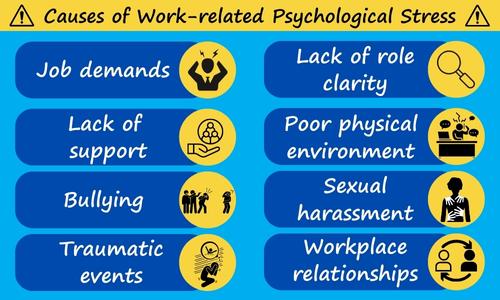Employees are under more strain than ever to satisfy the huge demands of work-life balance and financial concerns. While 9 out of 10 Australian workers believe it’s essential to operate in a psychologically healthy workplace, only about half feel their employers are actively addressing the main causes of work-related psychological injuries.
Mental health conditions are among the costliest workplace injuries, resulting in significantly longer absences and higher compensation compared to physical injuries. Over the years, the frequency and severity of psychological injuries have risen significantly. According to Safe Work Australia, of the approximately 10,000 serious mental stress claims in 2021-22, 52.2% were attributed to work-related harassment, bullying, or excessive work pressure.
Over the past decade, serious claims for mental health conditions have risen from 6.4% in 2012-13 to 10.5% in 2022-23, a 97.3% increase in the number of claims. These now account for 11% of all serious workplace claims, with a median time off work of 37 weeks and median compensation of $65,402.
In 2022, nearly 28% of workers reported experiencing a mental health condition, highlighting the urgent need for workplaces to address these risks. Work-related psychological injuries not only affect employees but also have profound consequences for their families and the businesses that employ them.
Workplace psychological injury can occur from stress, workload, and performance pressure, but it can also be triggered by workplace bullying and harassment. According to Fair Work, 91 percent of all claims for mental health conditions are connected to work-related stress. One-third of these are caused by job pressure, and 41 percent by bullying, harassment, or exposure to workplace violence. Identifying what causes psychological injury hazard is the first step that could potentially help to mitigate the cause.
Here are some steps for coping with psychological injury by intervening early and taking precautions to protect your employees from being ill or suffering from a psychological injury.

1. Creating a Stress-Reduction Policy
Consider creating a stress prevention and management policy. A stress policy can ideally foster mental well-being at work and reinforce the organisation’s commitment to reducing stress wherever possible. Keep resources readily available for all employees to ensure that stress indications and symptoms are recognised quickly within the team.
Educating and mentoring leaders, managers, and HR about the new policies are initiatives that directly contribute to the development of strengths and capacities for raising awareness among employees on how to tackle psychological stress. Communicate the measures you’re taking to improve psychological safety based on their feedback to make employees feel heard and that their ideas are valued.
2. Improve your Current Health and Wellness Program
Incorporate stress prevention into your existing health and wellness program by educating employees on the negative effects of excessive work hours, such as fatigue, reduced focus, poor performance, disrupted work-life balance, and increased health risks. An effective program identifies stressors and provides evidence-based strategies to reduce their impact while boosting productivity and well-being.
Providing easy access to mental health resources is equally important. Employee Assistance Programs (EAPs), stress management workshops, and digital tools for mindfulness or self-assessment give employees practical support. Partnering with psychologists or mental health organisations for webinars and one-on-one counselling ensures multiple avenues for professional help.
3. Promote Work-Life Balance
Supporting employees in achieving a healthy work-life balance is essential for reducing chronic stress and preventing burnout. Businesses can encourage regular breaks during the workday to help employees recharge but also boost overall productivity.
Offering flexible scheduling allows staff to adjust their hours to meet personal responsibilities, while setting clear expectations around after-hours emails or calls helps them disconnect and recover. For example, introducing weekly “no meeting” blocks gives employees uninterrupted time to focus on tasks or decompress, promoting both wellbeing and efficiency.
4. Monitor and Adjust Work Practices
Proactively monitoring and adjusting work practices is essential to maintaining a healthy workplace as the business grows and evolves. Regularly assessing workloads ensures that tasks and responsibilities remain manageable, reducing stress and preventing burnout.
Conducting employee surveys helps identify emerging stressors or issues within workplace culture, providing valuable insights for improvement. By acting on this feedback, your business can adjust processes, workflows, and policies to better support employees. For example, implementing a quarterly workload review process can help balance responsibilities and reduce peak stress periods, ensuring employees remain productive and supported.
5. Conduct Reviews and Feedback Surveys
Conducting frequent surveys and gathering data on a monthly, bi-annual, or yearly basis is critical for the business’s performance. It assists managers in identifying areas of stress and promotes higher mental health awareness by identifying employees’ experiences and opinions that are causing work-related psychological stress.
According to the 2019 People Management Report, managers who establish psychologically secure work environments had lower employee turnover on their teams.
6. Educate and Inform New Staff
Consider including stress management training into your new employee induction/orientation program. The induction program is the first procedure that new employees go through, and it is here that the organisation articulates its culture or the way we do things around here. Inform new employees that the business is dedicated to employee well-being and the prevention of psychological stress in the workplace.
Training new employees is required to shape the culture workplace, particularly for more conventional soft skills that affect team relationships and communication.
7. Start a Conversation
Start a conversation about the common sources of stress in your workplace, either with your team or with the management. Make psychological reduction a matter of discussion and an organisational priority.
Consult your team while making decisions about their ideas, views, and feedback. Not only will this make employees feel included in decision-making, but it will also foster psychological safety and contribute to better outcomes.
Workplace psychological injuries are rising but are preventable. By fostering a safe environment, promoting work-life balance, training managers, providing support resources, monitoring practices, and cultivating a positive culture, organisations can protect employee mental health and improve overall performance.

